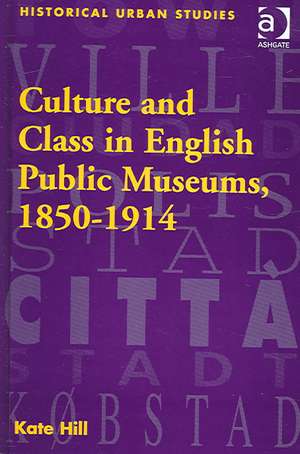Culture and Class in English Public Museums, 1850-1914: Historical Urban Studies Series
Autor Kate Hillen Limba Engleză Hardback – 20 mai 2005
| Toate formatele și edițiile | Preț | Express |
|---|---|---|
| Paperback (1) | 336.74 lei 6-8 săpt. | |
| Taylor & Francis – 11 noi 2016 | 336.74 lei 6-8 săpt. | |
| Hardback (1) | 759.78 lei 6-8 săpt. | |
| Taylor & Francis – 20 mai 2005 | 759.78 lei 6-8 săpt. |
Din seria Historical Urban Studies Series
-
 Preț: 386.77 lei
Preț: 386.77 lei - 23%
 Preț: 322.63 lei
Preț: 322.63 lei - 13%
 Preț: 336.74 lei
Preț: 336.74 lei - 13%
 Preț: 336.74 lei
Preț: 336.74 lei - 13%
 Preț: 336.74 lei
Preț: 336.74 lei -
 Preț: 459.90 lei
Preț: 459.90 lei -
 Preț: 459.90 lei
Preț: 459.90 lei -
 Preț: 386.77 lei
Preț: 386.77 lei -
 Preț: 459.90 lei
Preț: 459.90 lei -
 Preț: 459.90 lei
Preț: 459.90 lei -
 Preț: 459.90 lei
Preț: 459.90 lei -
 Preț: 459.90 lei
Preț: 459.90 lei -
 Preț: 459.90 lei
Preț: 459.90 lei - 23%
 Preț: 322.63 lei
Preț: 322.63 lei - 13%
 Preț: 298.12 lei
Preț: 298.12 lei - 13%
 Preț: 298.12 lei
Preț: 298.12 lei - 13%
 Preț: 298.12 lei
Preț: 298.12 lei
Preț: 759.78 lei
Preț vechi: 1026.94 lei
-26% Nou
Puncte Express: 1140
Preț estimativ în valută:
145.64€ • 152.86$ • 120.12£
145.64€ • 152.86$ • 120.12£
Carte tipărită la comandă
Livrare economică 23 ianuarie-06 februarie 25
Preluare comenzi: 021 569.72.76
Specificații
ISBN-13: 9780754604327
ISBN-10: 0754604322
Pagini: 192
Dimensiuni: 156 x 234 mm
Greutate: 0.41 kg
Ediția:1
Editura: Taylor & Francis
Colecția Routledge
Seria Historical Urban Studies Series
Locul publicării:Oxford, United Kingdom
ISBN-10: 0754604322
Pagini: 192
Dimensiuni: 156 x 234 mm
Greutate: 0.41 kg
Ediția:1
Editura: Taylor & Francis
Colecția Routledge
Seria Historical Urban Studies Series
Locul publicării:Oxford, United Kingdom
Cuprins
Contents: Introduction: interpreting museums; Negotiating the new urban environment; The public museum in the 19th century; The social characteristics of municipal museums; Reading the objects; Decoding the displays and layout; Consuming the museum: museum visitors; Conclusion; Bibliography; Index.
Notă biografică
Dr Kate Hill is Senior Lecturer in History at the University of Lincoln, UK
Recenzii
’...[Hill's] insights about museums as sites for class formation and the muted role of museums in social control are overdue, and the book will be welcomed by museums studies courses in particular as filling an important gap in the literature.’ Journal of Victorian Culture ’This is an engaging and timely book which looks at municipal and not national, English museums in the age of their most intense development, after the series of mid-nineteenth century Parliamentary Acts which allowed town councils to establish museums and to levy rates to do so. ...this is a sophisticated and persuasive book, which I imagine will form an important reference point for scholars working in similar areas. It surveys relatively new territory well and forms a very worthwhile contribution to the literature on museum history as well as to the debates about museum historiography.’ Museum and Society
Descriere
This work is in part a study of the creation of professional authority and autonomy by museum curators. More importantly though, it is about the stablization of middle-class identities by the end of the nineteenth century around new hierarchies of cultural capital. By examining urban identities through the cultural lens of the municipal museum, we are able to reconsider and better understand the subtleties of nineteenth-century urban society.

